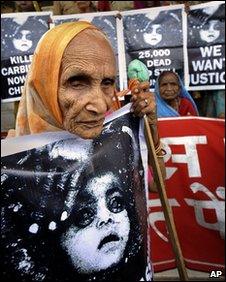Campaigners dismiss Bhopal compensation as insufficient
- Published

Thousands of people were affected by the gas leak in December 1984
A $280m compensation package announced by the Indian government for victims of the Bhopal gas disaster has been denounced by campaigners.
The compensation announced late on Thursday is the latest in a series of pay-offs made by the authorities to victims of the disaster.
The money will go into cleaning up the polluted factory site and improving medical treatment of surviving victims.
Some 3,500 people died within days and more than 15,000 in the years since.
The move follows public outrage after seven former managers at the plant were given two-year jail sentences.
The convictions are the first since the disaster at the Union Carbide plant - considered to be the world's worst industrial accident.
The government says Thursday's announcement will double the payout to families of the dead to $22,000, and increase payments for those with health defects.
It paid "interim compensation" of 3.6bn rupees ($78m) to victims in 1990.
And 20 years ago Union Carbide paid $470m (£282m) in compensation to the Indian government.
Amid rising public and media pressure the government appointed a group of senior ministers to look again at issues such as increased compensation for those affected, and what to do about continued pollution at the now abandoned plant.
Campaigners and groups working for the gas victims are meeting in the capital, Delhi, on Friday to protest against what they call the failure of the government to give "enhanced compensation" for the victims.
'Severely affected'
"We are not satisfied with the compensation, we are not satisfied with the rehabilitation [plan for victims] and we are not satisfied about the approach to corporate liability [in the new compensation package]," Rachna Dhingra told the BBC.
Information Minister Ambika Soni said the government would also gather new evidence against Warren Anderson [the then chairman of the US-based Union Carbide parent group] and "thereafter press the request for [his] extradition".
Mr Anderson is retired and lives in the US.
"More than 45,000 victims who were affected most severely by the tragedy will receive additional ex gratia payments," Ms Soni was quoted as saying by the AFP news agency.
The funds will be also used to upgrade local medical facilities and set up a research centre in Bhopal.
They will be used to clean up the polluted factory site which will be dismantled by 2012, Ms Soni said.
Dow Chemicals, which bought the company in 1999, says this settlement resolved all existing and future claims against the company.
But campaigners like Satinath Sarangi, who heads a group of survivors, said that the government must take "strong action" against Dow Chemicals.
"The government has failed to understand the scale of damage," Mr Sarangi said ahead of Thursday's announcement.
"There is no mention of the second and third generation victims and the constant medical complications being caused by the contamination," he added.
Correspondents say the fact that the Bhopal tragedy is back in the news at the same time as the huge oil spill in the Gulf of Mexico has added to the sense that victims of the 1984 disaster have been terribly let down.
An extradition treaty does exist between India and the United States - but so far all requests by India for Warren Anderson's extradition have been turned down by the American government.
- Published8 June 2010
- Published7 June 2010